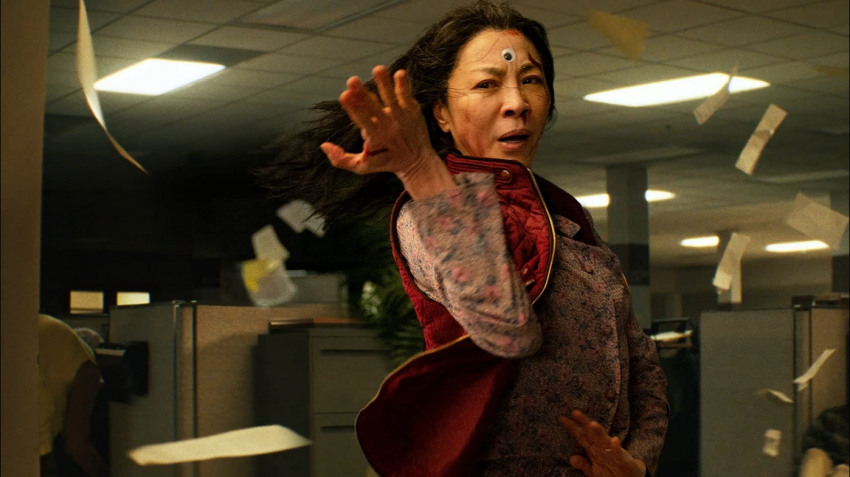
Everything Everywhere All at Once
Directed by Daniel Kwan & Daniel Scheinert
Available on selected stream services
Everything Everywhere All at Once deservedly scooped seven Oscars from eleven nominations. Okay, it’s a shame about Tár and The Banshees of Inisherin, but what this film does is very different, and it deserves its prizes.
Much of the recent publicity surrounding Everything Everywhere All at Once focused on Michelle Yeoh and the claim that the Oscar awards would at last put an Asian woman — Yeoh was born in Malaysia — in the film spotlight. Yeoh, from Crouching Tiger, Hidden Dragon to Star Trek Discovery, where she played wicked Emperor Georgiou in a parallel universe, has often played to the fantasy-oriental shadow-side of popular culture. But in this 2022 blockbuster she turns the tables as Evelyn, and emerges from assigned victim-status to fighting heroine.
Intersections
The film opens with a claustrophobic migrant family in a laundrette — classic stereotypical fare — and in these first sections you think WTF, have I stumbled into the wrong film here. Then an encounter with a nasty piece of work from the Inland Revenue Service — a brutally scary performance from Jamie Lee Curtis who at times lurches across the screen in Terminator mode — seems only to intensify the sense of insecurity of migrants at the hands of the state.
But then, suddenly and mysteriously, things open up and we are confronted with other worlds that run in parallel with this one, with worlds whose existence also drives home the point that migrant sub-worlds — subcultures that are so often inscrutable and sometimes romanticised — are themselves “other worlds”. When we say “another world is possible”, we could mistake this phrase as meaning that it is far off in the future, unattainable, but the other worlds that are possible are already here among us, there are many other ways of life, ways of being.
The film thus links the predicament of the migrant family, and the specific oppression of women in this family, and the intimate lives of those who are at the edge of family life — among them lesbian daughter Joy (played by Stephanie Hsu, who also picked up an Oscar) — with resistance and desire. The film is as much about generations and poverty as it is about all of those other things, and in the midst of that it is about solidarity.
Jump-cut universe
You may have to put up with some syrupy mother-daughter reconciliation stuff, yes, but that is actually a bit of a relief after the jump-cut start-stop film techniques that jolt you out of your comfort zone into a world of frenetic music-video-style set pieces (a speciality of the directors, the ‘Daniels’, Daniel Kwan & Daniel Scheinert, who won an Oscar, as did the film editor Paul Rogers).
Ke Huy Quan, who took one of the Oscars for a supporting role as Evelyn’s husband Waymond, was quite right to make the awards process as well as the film into a question about representation of the oppressed, noting that his journey “started on a boat”, reminding the audience that he “spent a year in a refugee camp”. United Nations High Commissioner for Refugees circulated the photo of him making this statement, and it is a powerful endorsement of the ethos of the film; inclusion of everyone everywhere and their right to everything.
[Abridged from anticapitalistresistance.org.]